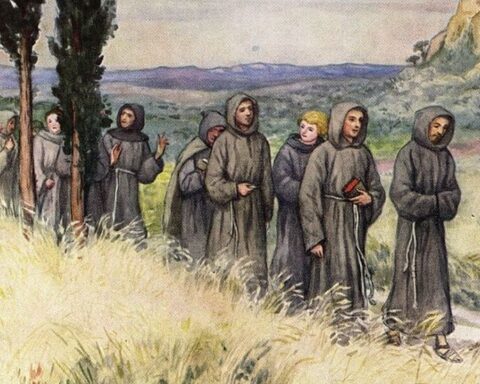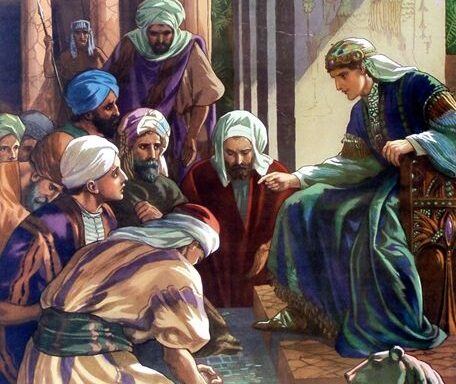
Editor’s note: The following comprises the fourth chapter, second part (B5), of The Gospel of Luke: An Exposition, by Charles R. Erdman (published 1936). All spelling in the original.
5. The Question of Fasting (5:33-39)
___________________________________________________
33 And they said unto him, The disciples of John fast often, and make supplications; likewise also the disciples of the Pharisees; but thine eat and drink. 34 And Jesus said unto them, Can ye make the sons of the bride-chamber fast, while the bridegroom is with them? 35 But the days will come; and when the bridegroom shall be taken away from them, then will they fast in those days. 36 And he spake also a parable unto them: No man rendeth a piece from a new garment and putteth it upon an old garment; else he will rend the new, and also the piece from the new will not agree with the old. 37 And no man putteth new wine into old wine-skins; else the new wine will burst the skins, and itself will be spilled, and the skins will perish. 38 But new wine must be put into fresh wine-skins. 39 And no man having drunk old wine desireth new; for he saith, The old is good.
___________________________________________________
The Pharisees were disturbed by the attitude of Jesus toward sinners. Much more were they distressed by his attitude toward the forms and ceremonies which to their mind constituted the very essence of religion. This attitude had been expressed by the failure of Jesus to require his disciples to observe the fasts which had become so prominent in the system of legalism taught by the religious leaders of the Jews. The Law of Moses prescribed no fasts. The rabbis had so multiplied them that a Pharisee could boast of fasting “twice in the week.” The disciples of John the Baptist were taught to fast frequently, not as an empty form, but to express the solemn character of the ministry of John who had come preaching “repentance unto remission of sins.” It was not strange, therefore, that the enemies of Jesus came to him with a complaint and with the question, “The disciples of John fast often, and make supplications; likewise also the disciples of the Pharisees; but thine eat and drink.” In his reply Jesus stated distinctly the view his followers should take, not only of fasting but of all religious forms: “Can ye make the sons of the bride-chamber fast, while the bridegroom is with them? But the days will come; and when the bridegroom shall be taken away from them, then will they fast in those days.” Fasting is an expression of sorrow. How absurd then would it be for Jesus’ followers to fast while the heavenly Bridegroom was with them! They might express their distress thus when he should be taken away. Thus Jesus declared that fasting, like all religious rites, may be quite fitting if it is a true expression of religious feeling, but if it is a matter of form, of rule, or requirement, if it is regarded as a ground of merit, it is an absurdity and an impertinence.
Jesus added a parable which further indicates his attitude toward all the rites and ceremonies in which the Pharisees took such delight. He declared that he had not come to regulate the fasts and feasts or to amend the Jewish ritual. That would be like sewing a new patch on an old garment. This religion of ceremonies had served its purpose. Jesus had come with something, new and better. The life of freedom and of joy which he was imparting could not be bound up in the narrow forms and rites of Judaism. New wine could not be kept in old wine skins.
Christianity cannot be comprehended by any system of rites and ceremonies. It must not be interpreted as a set of rules and requirements; it must not be confused with any ritual. It controls men, not by rules, but by motives. Its symbol is not a fast but a feast, for its pervasive spirit is joy.
As reported by Luke, Jesus added a characteristic phrase indicating his tender sympathy, “And no man having drunk old wine desireth new; for he saith, The old is good.” Those who long have been accustomed to a religion of forms find it difficult to be satisfied with the religion of faith. We must be patient with them. It is not easy for them to give up the practices of childhood and it takes time for them to learn the gladness and the freedom of spiritual maturity offered to the followers of Christ.
(Go back to previous chapter)
(Continue to next chapter)

The Gospel of Luke: An Exposition (Luke 5:33-39)
Latest from Religion

The Weimar Years – Part 1
This started out as an attempt to better understand Weimar Germany by chronicling my reactions to the audiobook version of “The Weimar Years: Rise and Fall 1918-1933” by Frank McDonough. Writing my

Alfredus Rex Fundator
"Alfred was a Christian hero, and in his Christianity he found the force which bore him, through calamity apparently hopeless, to victory and happiness."

The Story of Cortez
It seemed to me that, having to speak tonight to soldiers, that I ought to speak about soldiers. Some story, I thought, about your own profession would please you most and teach

The Coming of the Friars
When King Richard of England, whom men call the Lion-hearted, was wasting his time at Messina, after his boisterous fashion, in the winter of 1190, he heard of the fame of Abbot

“Joseph” by Charles Kingsley
Editor’s note: The following is extracted from The Works of Charles Kingsley, Vol. 25 (published 1885). (Preached on the Sunday before the Wedding of the Prince of Wales. March 8th, third Sunday



